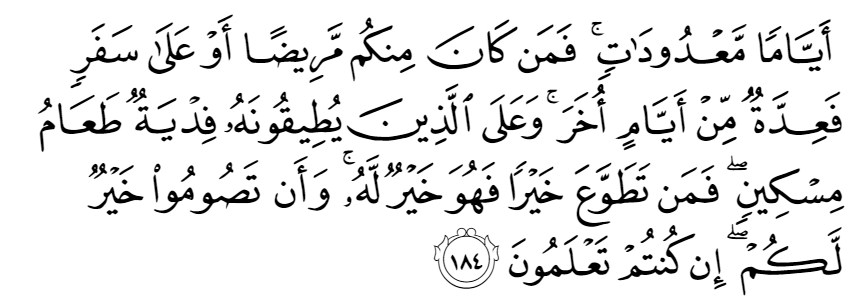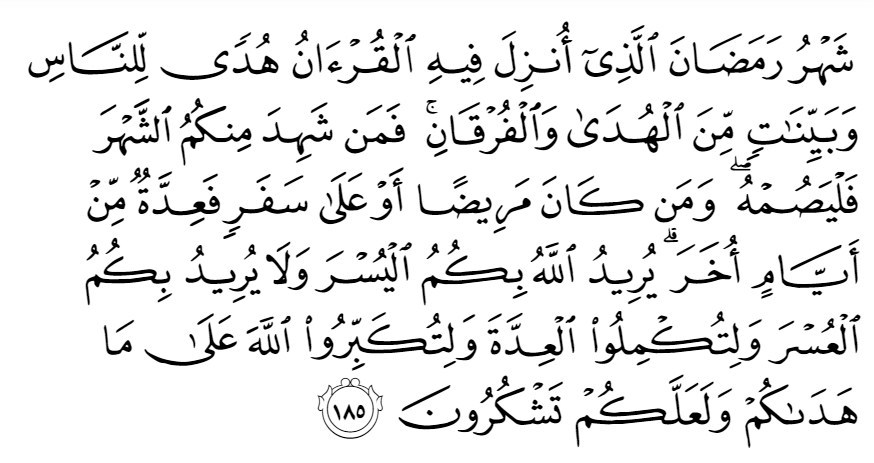The divine commandment for Fasting was revealed after the Hijrah (Emigration from Makkah to Madinah) when Muslims were set free from oppression, poverty and indigence that they had experienced at the hands of people of Makkah and started living in Madinah in ease and comfort.
Why fasting was not Ordained in Makkah?
Had the order for Fasting (Sawm) been given at Makkah, people might have related it to the Muslim’s resourcelessness and stringency during their stay in Makkah.
They could have developed a feeling that Fasting was for the poor, the indigent, the sufferer, and the oppressed people whereas the rich and the well-to-do, the owners of the gardens and lands were, perhaps, not the real addressees of this commandment.
Quran Verses on Fasting
The verses of the Quran which contain the order for Fasting as an obligatory duty for Muslims are as follows:

O you who believe, the fasts have been enjoined upon you as they were enjoined upon those before you, so that you may be God-fearing.

(Fasting is) for days few in number.
However, should any one of you be sick or on a journey, then (he should fast) a number of other days (equal to the missed ones);
and those who have the strength, (still, they do not opt for fasting,) on them there is a fidyah (compensation), that is, the feeding of a poor person.
Then whoever does good voluntarily, that is better for him. However, that you fast is better for you, if you only knew.

The month of Ramadan is the one in which the Qur’ān was revealed as guidance for mankind, and as clear signs that show the right way and distinguish between right and wrong.
So those of you who witness the month must fast in it.
But the one who is sick, or is on a journey (should fast) as much from other days (as he missed).
Allah intends (to provide) ease for you and does not intend (to create) hardship for you.
All this is so that you may complete the number (of fasts as prescribed) and proclaim the Takbīr of Allah for having guided you, and (so) that you may be grateful.
The verses of Quran which announced the obligatoriness of Fasting (Sawm) on the Muslims, do not lay down dry laws concerning Fasting which is generally noticed in the case of existing man-made laws, e.g. between the citizens and the ruler of a state.
Instead the verses of Quran appeal to the belief and faith, reason and conscience, heart and soul at the same time and prepare Muslims to take the commandment for Fasting as a most welcome tenet of religion and not as a dictate of law.
In fact this is an undeniable miracle of the Quran’s principles of calling to the Truth and its ability to formulate prudent and psychologically sound laws.

It is sent down by One full of wisdom, worthy of all praise [41: 42]
Objective of Fasting
The objective of Fasting in Islam is to discipline and reform the believers, not to put them to hardship.
Fasting serves as a medium of moral training for Muslims to rise to a level of moral and spiritual perfection where they learn to control their desires and deal as masters with their desires and not as slaves.
If Muslims develop a moral strength to give up desirable things such as cool water and tasteful food from dawn to dusk to observe Fasting, will they not then try to stay away from things forbidden by Allah?
Spiritual Benefits of Fasting in Islam
Fasting as prescribed in Islam, is perfect as an act of worship as well as in its laws and objectives and reflects the great wisdom of Allah, The Most Powerful, The Knowing, The Wise:
Allah says in Quran:

Should He not know— He that created? And He is the One that understands the finest mysteries (and) is well-acquainted (with them) [67:14]
The spiritual benefits of Fasting are elaborately mentioned in the following Hadith of Prophet Muhammad:
“ The deed of a son of Adam is increased several times (in Ramadan) and the reward is increased by ten times to seven hundred times.
Allah says that Fasting is specially for Him and He Himself will deliver its rewards (to His bondsman) as he abstains from eating and controls his desires only for Him.
There are (two instances of) happiness for the fasting Muslim: one is at the time of breaking his fast and the other at the time of meeting his Lord. And verily to Allah the smell of a fasting person’s breath is the best and cleanest?”
In another Hadith, Prophet Muhammad has mentioned the rewards of Fasting in this way:
“There is a door of Paradise called Rayyan toward which only the Fasting will be called. Only the Fasting will enter it and those who enter it will never feel thirsty.”
Wisdom of Fasting in Ramadan
Allah has ordained Muslims to fast in the specific month of Ramadan and has thus made Fasting and Ramadan dependent on each other. This union of the two sources of blessings contains great wisdom and importance.
Most importantly, it was the month of Ramadan in which the Quran was revealed and, thus, humanity was blessed with the brightness of the daybreak of the divine guidance.
It is, therefore, most appropriate that as the beginning of Fasting is tied up with daybreak, fasting for an entire month should also be tied up with the month of Ramadan which (due to the revelation of the Quran in it) marks the birth of a morning after a long and dark night of ignorance.
In addition, as the month of Ramadan is richer than all other months in Allah’s mercy and favour and in spiritual environment, it deserved well that its days were further adorned with Fasting and its nights with acts of worship.
There is a very intimate and special relationship between Fasting and the Quran. That is why the Prophet of Allah, blessings and peace be upon him, used to recite the Quran with greater interest and eagerness in the month of Ramadan.
Ramadan-A Global Season of Worship and Good Deeds
Ramadan is a global season and time of grand celebration of worship, God-remembrance, recitation of the Quran, self-restraint, and piety in which Muslims—educated and uneducated, rich and poor, humble and privileged; participate like close friends and associates all over the world.
No one can dare do rituals of Ramadan differently according to his personal understanding, nor is there any scope for a disagreement in determining the number of its days.
Impact of Ramadan on Muslims
The grandeur and beauty of Ramadan is easily noticed throughout the length and breadth of the Muslim world. It seems as if a canopy of light and peace is raised all over the Muslim society.
Even those who are slack in Fasting choose to fast in Ramadan for the fear of being alienated in the Muslim community. If for some reason they decide not to fast, they eat in the day hiding from others in shame. Of course, the sick and the traveller are lawfully exempted from Fasting.
Fasting is thus observed collectively throughout the world in the same month. This creates a congenial and conducive atmosphere for the believers due to which Fasting becomes easy, hearts of believers are softened and Muslims turn to deeds of worship and submission, sympathy and compassion with greater eagerness.
Sehri in Ramadan (Pre-Dawn Meal)
At night before the daybreak, Muslims take some food in order to keep up their energy for Fasting in the day (so that hunger and thirst do not become intolerable). This meal is called Sahoor or Sehri in Islamic terminology.
Sehri is a Sunnah and the Prophet of Allah has encouraged Muslims to observe this practice.
Prophet of Allah said:
“Take Sahoor because there is amplitude (Barakah) in it” (Bukhari, Muslim, Tirmidhi, & Nassai).
In another Hadith the Prophet of Allah said:
“The difference between our (Muslim) Fasting and that of the Ahle-Kitab (People of the Book) is marked by Sehri (Sahoor) (Pre-Dawn Meal)” (Muslim).
The Prophet of Allah has forbidden Muslims from delaying breaking of fast and has mentioned it to be a sign of digression and a mark of the extremists among the Ahle-Kitab (People of the Book).
Prophet of Allah said:
“ So long as Muslims keep on breaking fast without delay, they will remain on (the path of) virtue” (Bukhari, Muslim, Muatta, Tirmidhi).
Prophetic Practice on Iftaar
The Prophet (blessings and peace be upon him) used to break fast before the evening prayers (Salatul Maghrib).
If juicy dates were available, he ate some of them; otherwise he took dry dates.
If dates were not available, he drank some water.
He used to say the following words at the time of breaking fast:
O Allah! I observed fast for you and I break fast with the provision granted by You.
The thirst is satiated, the veins become wet and, God-willing, the reward is certain.
Safeguarding the Spirit of Fasting
The Islamic Shariah does not limit itself only to the physical etiquette of Fasting; it also pays full attention to its real aim and spirit.
Islamic Shariah has made unlawful not only eating, drinking, and sexual relationship during the period of Fasting, but has also forbidden the believers from all such things which defeat the noble aims of Fasting and destroy its spiritual and moral benefits.
It has circumscribed Fasting with discipline, piety, cleanliness and sincerity of heart and tongue.
The Prophet of Allah, blessings and peace be on him, once said,
“If any one of you is fasting, he should not indulge in abusive and useless talk, nor should he turn noisy creating disturbance.
If someone calls him names and picks up a quarrel with him, he should tell him that he is Fasting.”
The Prophet, blessings and peace be upon him, also said.
“He who does not give up telling lies and practicing upon them (should know that) Allah has no need that he should renounce eating and drinking.”
If the act of Fasting is devoid of sincerity and piety, it is like a form without reality, a body without soul.
The Prophet of Allah once emphasized this point in these words:
“There are many fasting people who do not earn from their fast anything except thirst, as there are devotees who do not get from their nocturnal prayers (Tahajjud) anything except vigil at night” (Bukhari).
A Muslim has to safeguard the ritual as well as the spirit of Fasting.
The Prophet, blessings and peace be on him, emphasized the same point in these words:
“Fasting is a shield until it is torn asunder.”
Fasting in Islam is not merely a command forbidding Muslims from eating and drinking, backbiting and aspersion, quarreling and cursing but it also encourages Muslims in a truly positive manner to learn to live a virtuous life and perform virtuous deeds.
Ramadan is therefore, the most suitable time for engaging oneself in good deeds, such as prayers and recitation of the Quran, remembrance and glorification of Allah, and sympathizing with and helping the needy and the poor.
The Prophet of Allah has said:
“If a person tries to win Allah’s pleasure with a virtuous deed in it (Ramadan), his deed will be considered equal to an obligatory deed (Fard) performed in days other than Ramadan.
And if a person performs an obligatory deed (Fard) in this month, his deed will be equal to seventy such obligatory deeds performed in days other than Ramadan.
This is the month of patience and the reward of patience is paradise.
This is the month of sympathy.”
Prophet of Allah also said:
“He who feeds a fasting person at the time of breakfast will get a reward equal to that of the fasting person, and the reward of the person fasting will not be reduced.”
Taraweeh Salah-Special Prayer of Ramadan
Allah has blessed the Muslim Ummah throughout the world with an eagerness and enthusiasm to observe the practice of offering special Ramadan prayers at night called Salatut Taraweeh.
All these points have made Ramadan a festival of worship, a season of recitation of the Quran, and an occasion of exultation and rejoice for the pious and the virtuous.
In this month Muslims distinctly exhibit a remarkably increased attachment to religion, love for Allah, and eagerness to compete with one another in performing good deeds.
Seclusion in Ramadan (Itikaf)
Seclusion in the mosque (Itikaf) in Ramadan in its last ten days is a deed bearing great rewards. It is a Sunnah (Prophetic tradition) very dear to Muslims. Itikaaf is a deed which safeguards for Muslims the benefits of Ramadan and accomplishment of its objectives.
During Itikaf Muslims engage themselves in good deeds, such as prayers, recitation of the Quran, remembrance of Allah, offering repentence, and invoking Allah’s blessings and peace on the Prophet.
The Prophet Muhammad observed Itikaf regularly every year, and afterward the Muslims throughout the world have very sincerely adhered to this practice.
Aisha, the dear wife of Prophet Muhammad says:
“the Prophet of Allah, blessings and peace be upon him, used to observe Itikaf in every Ramadan in its last ten days until he departed from the world. After him his (rightly guided) wives kept alive the practice of Itikaf.
Abu Hurraira, the famous companion of Prophet Muhammad said:
“the Prophet of Allah, blessings and peace be upon him, used to observe Itekaf every Ramadan in its last ten days. He observed Itikaf for twenty days in the year in which he passed away” (Bukhari).
Night of Power (Lailatul Qadr)
The great value of the Night of Power (Lailatul Qadr) has been emphasized in the Quran and in the Hadiths of the Prophet (blessings and peace be on him) at various places. At one place in the Quran a whole chapter is devoted to this theme:
We have sent it (the Qur’ān) down in the Night of Qadr.
And what may let you know what the Night of Qadr is?
The Night of Qadr is much better than one thousand months.
The angels and the Spirit descend in it, with the leave of your Lord, along with every command.
Peace it is till the debut of dawn. [97:1-5]
The Prophet Muhammad is reported to have said:
“The past sins of a person who remains engaged in acts of worship in the Night of Power with faith and awareness of Reckoning will be forgiven”
It is Allah’s wisdom and kindness that He has left Lailatul Qadr (Night of Power) unidentified and has simply referred to it as one falling in the last ten days of Ramadan.
This, as a matter of fact, encourages Muslims to adorn all the last ten nights of Ramadan with acts of worship, supplication and invocation in search of this night as the Prophet himself used to do.
Aisha (may Allah be pleased with her) narrates: “During the last ten days of Ramadan, the Prophet of Allah, blessings and peace be on him, used to stay awake all night, wake up the members of his family too, and become alert and enthusiastic”.
In another Hadith related again by Aisha, the Prophet of Allah said:
“Search Lailaiul Qadr in the odd nights of the last ten days of Ramadan” (Bukhari).
Moon of Eid-Marking the End of Ramadan
Time passes fast and the month of Ramadan comes to an end quicker than expected. The eagerness of the believers for offering devotional services and attaining spiritual excellence was not yet satiated.
The call rising from believer’s hearts still demanded “can I have more of Ramadan”, and even the commoners were becoming increasingly attached to Fasting; it happens that the moon of the next month rises in the sky.
With sighting of new moon, the month of Ramadan bids farewell to Muslims with a promise to come again next year.
With the sight of the moon of the new month the hearts of Muslims are filled with thankfulness marked with patience which they experienced in Ramadan.
Thus Ramadan, a guest and messenger of Allah bids farewell to Muslims but another guest and messenger Eid, arrives in its place.
Just yesterday it was forbidden to eat in the day and now tomorrow it will be forbidden to abstain from food. To fast till today was the was the order of Allah and to feast tomorrow is the order of Allah as well.

